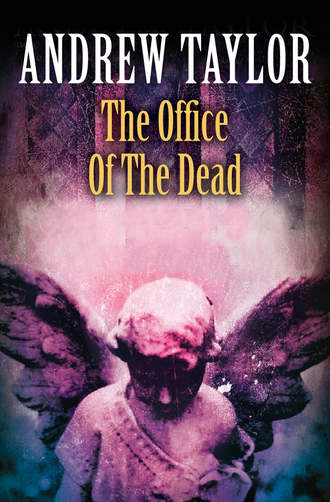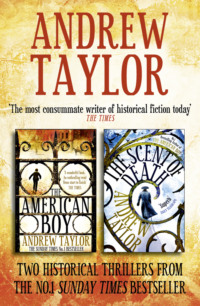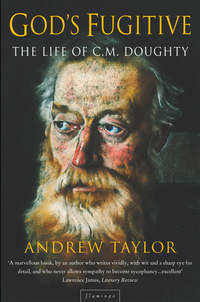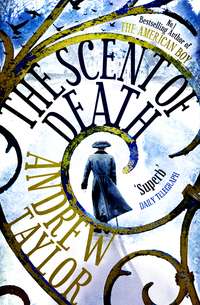
Полная версия
The Office of the Dead
Mr Treevor was standing beside the table. He was in his pyjamas, but without his teeth, his slippers and his dressing gown. He was sobbing. Janet was patting his right arm with a tea towel. David, also in pyjamas, was frowning at them both. There was a puddle of water on the table, and the front of Janet’s nightdress was soaked. The room smelled of singed hair and burning cloth.
Afterwards we reconstructed what had happened. Mr Treevor had woken early and with a rare burst of initiative decided to make himself some tea. He went downstairs, lit the gas and put the kettle on the ring. It was unfortunate that he forgot you had to put water in the kettle as well. After a while, the kettle started to make uncharacteristically agitated noises so he lifted it off the ring. At this point he forgot two other things – to turn off the gas, and to cover the metal handle of the kettle with a cloth. The first scream must have been caused when the metal of the handle burnt into his fingers and the palm of his hand.
David stared at me. ‘We must have a first-aid box somewhere, mustn’t we?’
‘Phone the doctor,’ I said to him. ‘Quickly.’
‘But surely it’s not a –’
‘Quickly. Mr Treevor’s had a bad shock.’
He blinked, nodded and left the room.
I pulled a chair towards the sink, and with Janet’s help drew Mr Treevor down on to it. I turned on the tap and ran cold water over his hand and arm.
‘Janet, why don’t you take Rosie back to bed and fetch a blanket? Have you got any lint?’
‘Yes, it’s –’
‘You’d better bring that as well. And then what about some tea?’
There’s a side of me that derives huge pleasure from telling people what to do. No one seemed to mind. Gradually, Mr Treevor’s sobs subsided to whimpers and then to silence. By the time the doctor arrived, all four adults were huddled round the kitchen boiler drinking very sweet tea.
The doctor was Flaxman. I recognized his name from Janet’s letters – he had been helpful when she was pregnant. Later I came to know him quite well. He had a long, freckled face, flaking skin and red hair. He examined Mr Treevor, told us to put him to bed and said he would call later in the day.
In the afternoon, Flaxman returned. He spent twenty minutes alone with Mr Treevor and then came down and talked to us in the sitting room. David was still at the Theological College.
‘How is he?’ Janet asked.
‘Well, the bums aren’t a problem. He’ll get over those. It could have been worse if you hadn’t acted promptly.’
‘We’ve Mrs Appleyard to thank for that.’ Janet smiled at me.
Flaxman sat down. He didn’t look at me. He began to write a prescription.
‘Would you like a cup of tea? Or some sherry? It’s not too early for sherry, is it?’
‘No, thanks.’ He tore off the prescription and handed it to Janet. These will help Mr Treevor sleep, Mrs Byfield. Give him one at bedtime. If he complains of pain, give him a couple of aspirin. Tell me, where does he live?’
‘He has a flat in Cambridge.’
‘Does he live alone?’
‘There’s a landlady downstairs. She cooks for him.’
‘How long will he be staying with you?’
Janet wriggled slightly in her chair. ‘I don’t really know. My husband was going to take him back tomorrow but in the circumstances, I suppose –’
‘I’d advise you to keep him here a little longer. I’d like to see him again over the next few days. I think his condition needs assessment. Perhaps you’d let me have the address of his GP.’
‘He wasn’t properly awake this morning,’ Janet said, clutching at straws. ‘He’s not been sleeping well.’
‘The sleeping tablets will help that. But the point is, he needs looking after. I don’t mean he needs to be hospitalized, but he needs other people around to keep an eye on him.’
‘Is – is this going to get worse?’
‘It may well do. That’s one reason why we need to keep an eye on him, Mrs Byfield–to see if he is getting worse.’
‘And if he is?’
‘There are several residential homes in the area. Some private, some National Health.’
‘He’d hate that. He’d hate the loss of privacy.’
‘Yes, but his physical safety has to be the main concern. Could he live with you or some other relative?’
‘Permanently?’
‘If you don’t want him to go into a residential home, that would probably be the best solution, Mrs Byfield. At least until his condition deteriorates a good deal more.’
‘But – but what exactly’s wrong with him?’
‘At this stage it’s hard to be categorical.’ He glanced quickly at us both. ‘But I think he’s in the early stages of a form of dementia.’
There was a long silence. I wanted to say to Janet, You’ve got enough on your plate, but for once I kept my mouth shut.
Then she sighed. ‘I shall have to talk to my husband.’
13
Janet and I went to Mr Treevor’s flat on Saturday. We drove over to Cambridge, another small victory for me hard on the heels of my display of Girl Guide first aid. In a sense I was beginning to shed my burdens just as Janet was shouldering more.
David had assumed that Janet would go by bus. It was after all cheaper than going by train.
‘Why not the car?’ I said on Friday evening, emboldened by my Girl Guide expertise and by a substantial slug from the gin bottle in my bedside cupboard.
‘Janet doesn’t drive.’ David hardly bothered to glance at me. ‘I’d take you myself, of course, but unfortunately I’ve got my classes in the morning and then there’s a meeting first thing in the afternoon. The Finance Committee.’
‘I’ll take her,’ I said.
This time David looked properly at me. ‘I didn’t realize you drove.’
‘Well, I do. But what about insurance?’
‘It’s insured for any driver I give permission to.’
‘There you are. Problem solved.’
‘But have you driven recently, Wendy? It’s not an easy car to drive, either. It’s –’
‘It’s a second series Ford Anglia,’ I interrupted. ‘We had one for a time in Durban, except ours was more modern and had the 1200 cc engine.’
‘I see.’ Suddenly he smiled. ‘You’re a woman of hidden talents.’
I smiled back and asked Janet when she would like to go. I felt warm and a little breathless, which wasn’t just the gin. That’s biology for you. David upset a lot of men in his time but I never knew a woman who didn’t have a sneaking regard for him, who didn’t enjoy his approval.
Janet and I had six hours of freedom. The charwoman agreed to come in for the day and keep an eye on Mr Treevor and Rosie. Rosie liked the charwoman, who gave her large quantities of cheap sweets which Janet disapproved of but dared not object to.
The road from Rosington to Cambridge is the sort of road made with a ruler. The Fens could never look pretty, but the day was unseasonably warm for early March and the sun was shining. It was possible to believe that spring was round the corner, that you’d no longer be cold all the time, and that problems might have solutions.
Mr Treevor’s flat was the upper part of a little mid-Victorian terraced house in a cul-de-sac off Mill Road, near the station. I hadn’t known what to expect but it wasn’t this. The landlady, the widow of a college porter, kept the ground floor for herself. Mr Treevor and the widow and the widow’s son shared the kitchen, which was at the back of the house, and the bathroom which was beyond the kitchen, tacked on as an afterthought.
The landlady was out. Janet let herself in with her father’s key and we went upstairs. I must have shown what I was feeling on my face.
‘It’s a bit seedy, I’m afraid,’ she said.
‘It doesn’t matter.’
‘You didn’t think he’d live somewhere like this, I suppose? He wanted to stay in Cambridge, you see, and it was all he could afford when Mummy died.’
Janet took me along the landing to the room at the front, which was furnished as a sitting room. It smelled of tobacco, stale food and unwashed bodies.
‘She gives him his breakfast and an evening meal,’ Janet said, meaning the landlady, ‘and she’s meant to dean for him as well and send his washing to the laundry.’ She threw up one of the sash windows and cold, fresh air flooded into the room. ‘I don’t think she does very much. That’s one reason why I didn’t warn her we were coming.’
‘I’m sorry. I – I suppose there was nowhere better available.’
‘Beggars couldn’t be choosers.’ She turned round to face me. ‘There was enough money when I was growing up. My mother was always working and she was good at her job. They were queuing up for her. And Daddy had a little money of his own. Not much, about a hundred a year, I think. They didn’t have pensions or anything like that. I think they more or less lived up to their income.’
‘It’s all right,’ I said awkwardly, because I was English and in those days the English hated talking about money, especially with friends. ‘I quite understand.’
Janet was braver than me, always was. ‘When Mummy was ill, the translation work dried up and they had to live on Daddy’s capital. So what with one thing and another there wasn’t much left when Mummy died.’ She waved her arm. ‘But he had this. He could be independent and he loves Cambridge.’
I said, suddenly understanding, ‘You and David are helping to pay for this, aren’t you?’
She nodded. ‘Only a little.’
‘That’s something,’ I said. ‘You won’t have to any more.’
But I knew as well as she did that they would have to pay for other things now, and in other ways.
John Treevor was still alive and less than twenty miles away in Rosington. Yet as we moved around his flat, sorting his possessions, it was as if he were already dead. His absence had an air of permanence about it.
His possessions dwindled in significance because of this. People lend importance to their possessions and when they’re dead or even absent the importance evaporates. I remember there was a thin layer of grime on the windowsills, dust on the books, holes in most of the socks.
‘It would be much simpler if we could just throw it all away,’ Janet said as she closed the third of the three suitcases we’d brought with us. ‘And what are we going to do about his post? He’s not going to want to write letters.’
While I took the suitcases down to the car, Janet went through the drawers of the desk. When I came back there was a pile of papers on top and she was looking at a photograph, tilting it this way and that in front of the window.
‘Look.’
I took it from her. The photograph was of her when she was not much older than Rosie, a little snapshot taken on the beach. She was in a bathing costume, hugging her knees and staring up at the camera. I handed it back to her.
‘It was before the war. Somewhere like Bexhill or Hastings. We used to go down to Sussex to stay with my grandparents. I thought it was heaven. Daddy taught me to swim one summer, and he used to read me to sleep.’ Her voice was trembling. ‘There was a collection of fairy stories by Andrew Lang, The Yellow Fairy Book. I’d forgotten all about it.’
She foraged for her handkerchief in her handbag and blew her nose.
‘Why did it have to happen to him?’ she said angrily, as though it were my fault. ‘Why couldn’t he just have grown old normally, or even died? This is nothing. It’s neither one thing nor the other.’
I said nothing because there was nothing to say.
Janet left a note for the landlady. I took her out to lunch and afterwards we walked in the pale sunshine through St John’s College and on to the Backs. It wasn’t much of an attempt at consolation but it was the only one I could think of.
Now the decision had been made, David felt there was no point in delay. Over the next few weeks we sold or gave away or threw away two-thirds of the contents of the flat.
Mr Gotobed, the assistant verger, helped David bring the rest of Mr Treevor’s belongings back to the Dark Hostelry. Puffing and grunting, the two men carried some of the furniture – the desk, the chair, the glass-fronted bookcase – up to Mr Treevor’s bedroom to make it seem homely. Janet arranged photographs on the desk, herself and her mother, both in newly cleaned silver frames. She brought her father’s pipe rack and tobacco jar, not that he smoked any more, and put them where they used to stand on his desk.
I’m not sure this was a good idea. One morning, shortly after we’d finished the move, Mr Treevor emerged from the bathroom as I was coming down the stairs from my room. He laid his hand on my arm and looked around as if checking for eavesdroppers.
‘There’s funny things happening in this house,’ he confided. ‘They’ve got the builders in. They’ve been changing my room. It must be at night because I’ve never actually seen them at work. I’ve seen one of them in the hall, though. Furitve-looking chap.’ He padded across the landing towards his room. At the door he glanced back at me.
‘Better keep your eyes skinned, Rosie,’ he hissed. ‘Or there’s no knowing what they’ll get up to. Can’t be too careful. Especially with a pretty girl like you.’
Rosie?
14
I have to admit the Cathedral came in handy when it was raining. You could walk almost the length of the High Street under cover. Or you could cut across from the north transept to the south door and avoid going right the way round the Cathedral outside. And sometimes if the choir was practising or the organ was playing I’d sit down for a while and listen.
That’s where Peter Hudson found me.
It was raining heavily that morning, silver sheets of icy water sweeping across the Fens from the east. I had been to the Labour Exchange in Market Street. The woman I talked to disapproved of me. Was it my-lipstick? The tightness of my skirt? The fact I’d forgotten to bring my gloves? I suspect she labelled me as louche, dangerously sophisticated and a potential husband-snatcher. Which tells you as much about the competition as it does about me.
At present the Labour Exchange had only two jobs for which I was suitably qualified. They needed someone behind the confectionery counter in Woolworth’s. Or, if I preferred, I could earn rather more if I worked shifts at the canning factory on the outskirts of town. Neither of them had anything to be said for them except money, and there wasn’t much of that on offer either.
I was beginning to think I’d have to go back to London. I didn’t want to do that, partly because I thought Janet needed me but more because I knew I needed her. It wasn’t just the breaking up with Henry. It was as if every mistake I had ever made in my life had come back to haunt me. It was rather like when you leave a hotel and they present you with a bill that’s three times larger than you thought it was going to be.
I entered the Close by the Boneyard Gate from the High Street and ducked into the north door of the Cathedral to get out of the rain. Actually, it wouldn’t have taken me much longer to stay in the open and reach the Dark Hostelry. But Janet was there and I wanted a moment or two by myself to catch my breath and decide what I was going to say to her.
Walking into the Cathedral was like walking into an aquarium, as if you were moving from one medium to another. Here the air was still, cool and grey. Gotobed, the assistant verger, gave me a quick, shy smile and scurried into the vestry. The building smelled faintly of smoke, a combination of incense and the fumes from the stoves that fired the central heating. I remember these stoves far better than anything else in the Cathedral. They were dotted about the aisles like cast-iron birdcages. The stoves were circular, domed, about the height of a man but much wider. Perched on top of each one was a cast-iron crown which would have fitted a very small child.
The choir was rehearsing behind the screen dividing the space beneath the Octagon from the east end. I couldn’t see them but the sound of their voices welled into the crossing and poured into transepts and nave. Gotobed came out of the vestry, but this time he didn’t look at me because he was on duty, carrying his silver-tipped wand of office and conducting Mr Forbury in a procession of one back to the Deanery.
I sat down on a chair, wiped the rain from my face and tried to think. Instead I listened to the sound of the voices spiralling up into the Octagon below the spire. The nearest I came to thinking was when I found myself wondering what Henry was doing at this moment, and where, and with whom. He must have found another woman by now, someone else willing to make a fool of herself because he flattered and amused her.
Then I noticed Canon Hudson coming out of the vestry. To my annoyance he came over towards me. That was one of the problems of Rosington. I had been used to the anonymity of cities.
‘Hello, Mrs Appleyard. Enjoying the singing?’
‘I don’t know what it is but it’s very restful.’
‘We’re rather proud of our music here. If you’re here over Easter, you should –’
‘I don’t think I will be,’ I said roughly, the decision suddenly made.
‘You’re leaving us?’
‘I need to find a job. There’s nothing down here. Or rather, nothing that appeals.’
He sat down beside me and folded his hands on his lap. ‘And what exactly are you looking for, Mrs Appleyard?’
‘I don’t really know. But my husband’s left me so I’m going to have to make my own living now.’ I wished I could take the words back. My private life was none of his business. Janet had told other people that my husband was ‘away’. I glanced at my watch and pantomimed surprise. ‘Oh! Is that the time?’
‘Difficult for you,’ he said, ignoring my attempt to wind up the conversation. ‘Am I right in thinking you’d prefer to stay in Rosington for the time being?’
‘Well, it’s a possibility.’
‘You say you have no qualifications.’
‘Apart from School Certificate.’
‘And have you ever worked?’
‘Only in my father’s shop for a few years before I married. He was a jeweller.’
‘What did that entail?’
I nearly told him to mind his own business, but he was such a gentle little man that being unkind to him seemed as wantonly cruel as treading on a worm. ‘It varied. Sometimes I served in the shop, sometimes I helped with the accounts. I did most of the inventory when we sold the business.’
The music spiralled round and round above our heads. Just like me, it was trying to get out.
‘How interesting,’ Hudson said. ‘Well, if you really are looking for something local, in fact I know of a temporary part-time job which might fit the bill. It’s actually in the Close and to some extent you could choose the hours you work. But I don’t know whether it would suit you. Or indeed whether you would suit it.’ He smiled at me, taking the sting from the words. ‘I want someone to catalogue the Cathedral Library.’
I stared blankly at him. Still smiling, he stared back.
‘But I wouldn’t know where to start,’ I said. ‘Surely you’d need a librarian or a scholar or someone like that? It’s not the sort of thing I could do.’
‘How do you know?’
‘It’s obvious.’
‘Mrs Appleyard, what’s obvious to me is that it could suit us both if you were able to help. So it’s worth investigating, don’t you think?’
I shrugged, ungracious to the last.
‘Why don’t you have a look at the library now? It won’t take a moment.’
He was a persistent little man and in the end it was easier to do what he wanted than to refuse. He fetched a key from the vestry and then took me over to a door at the west end of the south choir aisle. He unlocked it and we stepped into a long vaulted room.
Suddenly it was much lighter. On the east wall, high above my head, were two great Norman windows filled with plain glass. A faded Turkish runner ran from the door along the length of the room’s long axis towards a pair of tables at the far end. On either side of the runner were wooden bookcases, seven feet high, dividing the room into bays. The temperature wasn’t much warmer than in the Cathedral itself, which meant it felt chilly even to someone inured to the draughts of the Dark Hostelry.
‘Originally the room would have been two chapels opening out of the south transept,’ Peter Hudson said. ‘It was converted into a library for the Cathedral in the eighteen-seventies. No one knows for sure, but we think there must be at least nine or ten thousand books here, possibly more.’
We walked the length of the room. I looked at the rank after rank of spines, most vertical, a few horizontal, bound in leather, bound in cloth. The air smelled of dust and dead paper. I already knew I didn’t have the training to do a job like this and probably not the aptitude either. But what I saw now was the sheer physical immensity of it.
One night at Hillgard House, Janet and I had sneaked out of our dormitory, slipped down the stairs and out of a side door. The sky was clear. We were in the middle of the country and in any case there was a blackout because it was wartime. We lay on our backs on the lawn, feeling the dew soaking through our nightdresses, and stared up at the summer sky.
‘How many stars are there?’ Janet murmured.
And I’d said, ‘You could never count them.’
Terror had risen in me, a sort of awe. Facing all those books in the Cathedral Library I felt the same awe, only once removed from panic. Like the night sky, the library was too big. It contained too many things. I just wasn’t on the right scale for it.
‘I’m sorry, I don’t think this will work.’
‘Let’s sit down and talk about it,’ Hudson suggested.
At the end of the room were two large tables and an ill-assorted collection of what looked like retired dining chairs. Behind the tables was a cupboard built along the length of the wall. Hudson pulled out one of the chairs and dusted it with his handkerchief. I sat down.
‘It’s such a big job, and anyway I wouldn’t know how to do it. I expect a lot of the books are valuable. I could damage them.’
He dusted another chair and sat down with a sigh of relief. Clasping his hands on the table, he smiled at me. ‘Let me tell you what the job would entail before you make up your mind.’
‘Aren’t there medieval manuscripts? I wouldn’t have the first idea how to read them.’
‘The Cathedral does possess a few medieval manuscripts and early printed books. But they’re not here. They’re either under lock and key in the Treasury or they’re on loan to Cambridge University Library or the British Museum. Nothing to worry about there.’
‘If you say so.’
‘You see, this library is a relatively recent affair. What happened was this – in the nineteenth century Dean Pellew left the Cathedral his books, about twelve hundred volumes. That’s the nucleus of the collection. He also left us a sum of money as an endowment. So the chapter has a separate library fund which is there for buying new books and which can also be used for paying an assistant to manage the day-to-day work of the library. When the endowment was set up it was arranged that one of the canons should be the librarian and oversee the running of it. My immediate predecessor took over in 1931. He died in office last year so he had a long run for his money. But he didn’t do much with the library.’ Hudson smiled at me. ‘And for the last ten years of his life, I doubt if he gave it a thought. Somehow it came to be understood that Cathedral librarian was one of those honorary posts. We’ve got enough of those on the Foundation, heaven knows. And then I took over.’
‘Janet said there’s a possibility the books might be given to the Theological College Library.’
He nodded. ‘The dean and chapter have decided to close the Cathedral Library. It’s not been formally announced yet but it’s an open secret. The legal position’s rather complicated – it’s a question of diverting the endowment to something else relating to the Cathedral. And then there are the books, which is where you would come in. They’re hardly ever used here, and frankly it’s a waste of space having them here.’
‘I wouldn’t have thought space was a problem in this building.’








